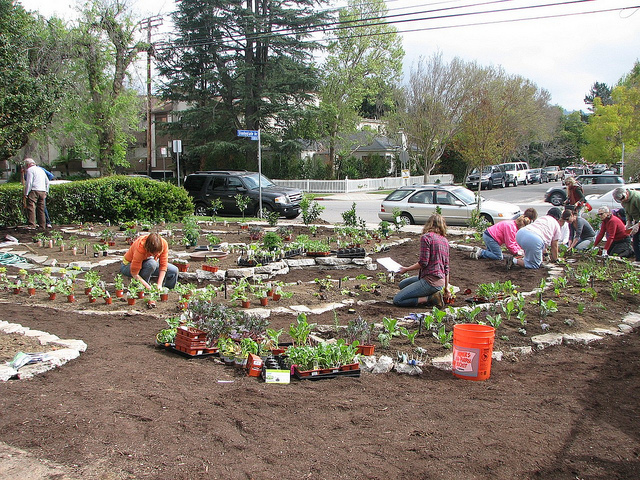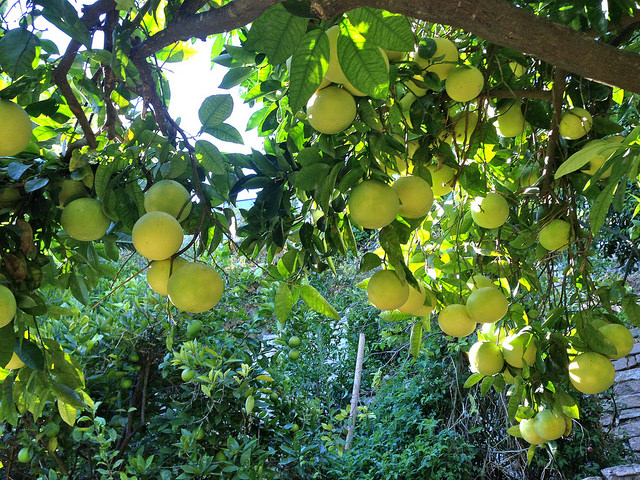For the last year, Rose Prevezer worked as the rabbinic intern at Netiya, an interfaith food justice network in Los Angeles. This internship is run in partnership with JOIN for Justice. We are so grateful for this thoughtful reflection that Rose shared with us — about growing food, shmita, forgiving debt and working for justice.
My time working as the rabbinic intern for Netiya, an inter-faith food justice network based in Los Angeles, has been focused on education and community organizing around the Shmita, or Sabbatical, year that started last Rosh Hashana, The shmita year is a year of rest for the land of Israel that the Torah states should occur every seven years as “a Sabbath for God”. We are told that “for six years you are to sow your land and to gather in its produce, but in the seventh, you are to let it go and to let it be, that the needy of your people may eat, and what remains, the wildlife of the field shall eat” (Exodus 23:10-11). In the shmita year all produce is ownerless. You can store items from the previous six years’ harvest to survive but you are not permitted hoard more than you need; the excess must be made hefker (free) to all. At the end of the shmita year all debt is cancelled, for no man is “to oppress his neighbor or his brother” (Deuteronomy 15:2).

Shmita has long been relegated to the abstract in contemporary Jewish life. As its halachic rules and regulations apply only in Israel, Diaspora Jewry largely ignored its teachings. Moreover, in Israel itself, loopholes in Jewish law – developed for the purpose of allowing agriculture to survive in the early years of the State and intended to be time-limited – became normative practice. However, recent years have seen a flourishing of interest in shmita and an increased understanding of the relevancy and ethical power of its practices.
There has been an acknowledgment that the lessons and benefits of shmita are multiple and universal. Shmita teaches the value of long-term agricultural good practice and sustainability by encouraging rest and respect for the land and its potential yield. Shmita draws our attention to the intersections between poverty, debt and food insecurity, and radically shifts our understanding of ownership. Shmita articulates the relationship between rest and dignity in way that forces us to address not only our own individual and organizational work commitments and stresses, but also labor rights and widespread wage inequality.

Shmita promotes the role of empathy in creating a more equal society. For one year all people share in the resulting abundance or insecurity. How does this shared experience have the potential to change us? How does it alter the way we are in relationship with one another? Going forward will we be more alert to societal ills, more conscious in our consumerism, more attuned to the needs of the land? Will shmita result in the kind of spiritual and social awakening envisaged by Rav Kook in his introduction to his treatise on shmita, “The Sabbath of the Land:”
“What the Sabbath achieves regarding the individual, the Shmita achieves with regard to the nation as a whole. A year of solemn rest is essential for both the nation and the land, a year of peace and quiet without oppressor and tyrant…It is a year of equality and rest, in which the soul reaches out towards divine justice, towards God who sustains the living creatures with loving kindness. There is no private property and no punctilious privilege but the peace of God reigns over all in which there is the breath of life. Sanctity is not profaned by the exercise of private acquisitiveness over all this year’s produce, and the covetousness of wealth stirred up by commerce is forgotten…Life can only be perfected through the affording of a breathing space from the bustle of everyday life.”
This shmita year, environmental and social justice organizations in Israel and the Diaspora have been working to educate and encourage communities to find ways to practice and infuse their daily experience with the values of shmita. In Southern California Netiya has been at the forefront of this endeavor, and as their outgoing rabbinic intern I have been working with communities and groups throughout Los Angeles to explore the relationship between shmita, spirituality, debt and food relief. In particular we have been examining the myriad ways in which shmita can be observed and celebrated today, whether one lives in Israel or not.

At Netiya we have been speaking and teaching about shmita in synagogues and churches, schools and institutions throughout the city. We have been using the model of shmita to examine our own organizational practices and encouraging others to do the same. We have been hosting workshops and events – on gardening, water conservation, planting, pickling, and harvesting – in order to promote long-term sustainable food practices.
We have been working to ensure that the lessons of the shmita year will continue to impact and change the lives of our communities for the better. It has been a privilege to be part of this conversation.
 Rose Prevezer is a rabbinical student at the Ziegler School of Rabbinic Studies, Los Angeles. She has worked as Netiya’s Rabbinic and Community Organizing intern and is an active member of the Minyan Tzedek Organizing Path at Ikar, a social-justice focused spiritual community. Rose is pictured at the far left of the photo on the right. She’s with a group of 7th graders at Ikar who have just learned how to harvest a carrot!
Rose Prevezer is a rabbinical student at the Ziegler School of Rabbinic Studies, Los Angeles. She has worked as Netiya’s Rabbinic and Community Organizing intern and is an active member of the Minyan Tzedek Organizing Path at Ikar, a social-justice focused spiritual community. Rose is pictured at the far left of the photo on the right. She’s with a group of 7th graders at Ikar who have just learned how to harvest a carrot!






